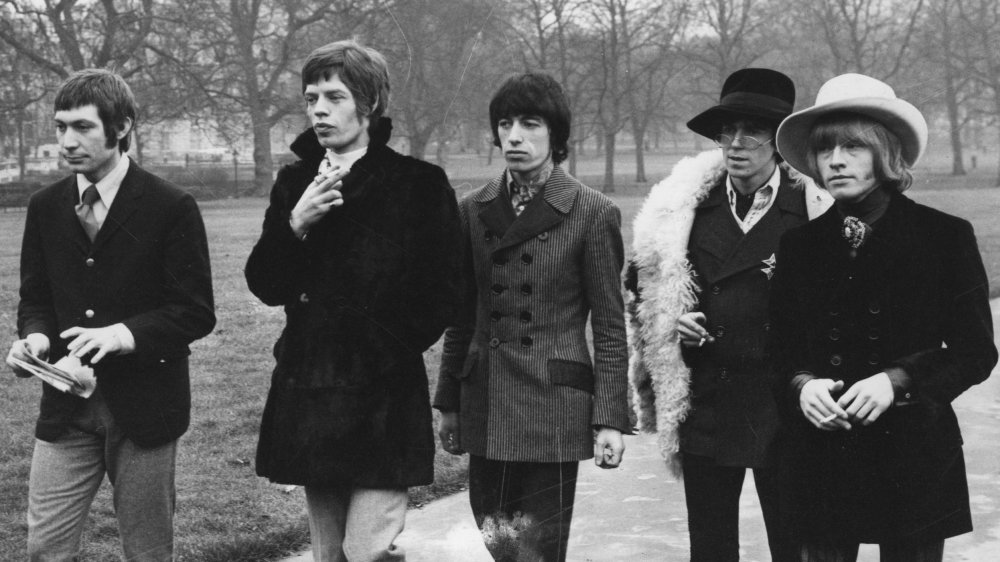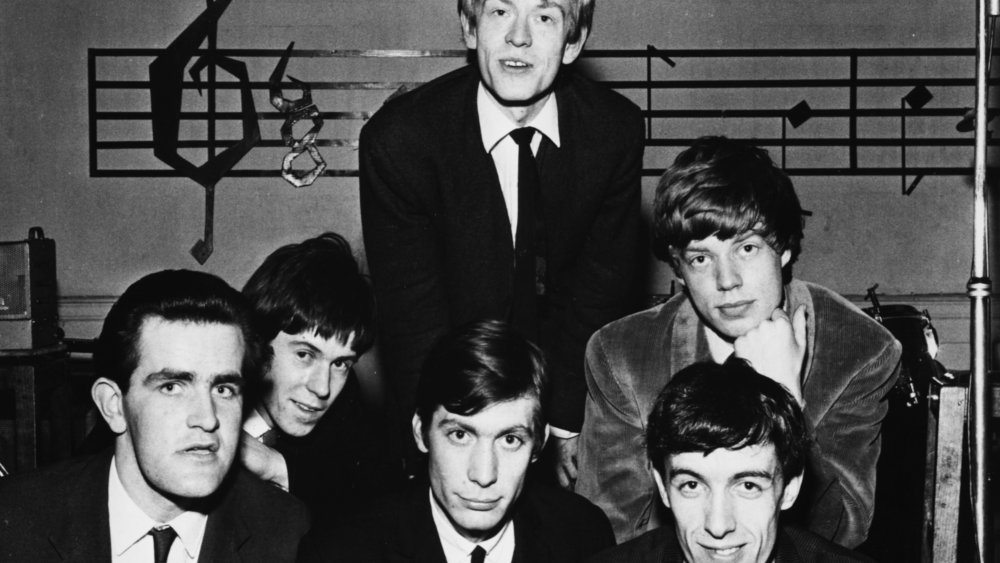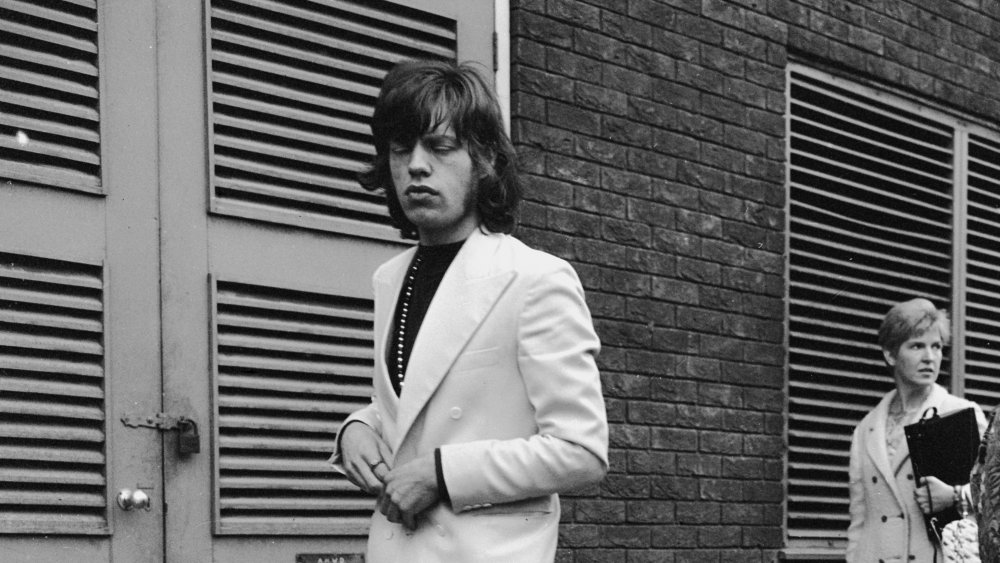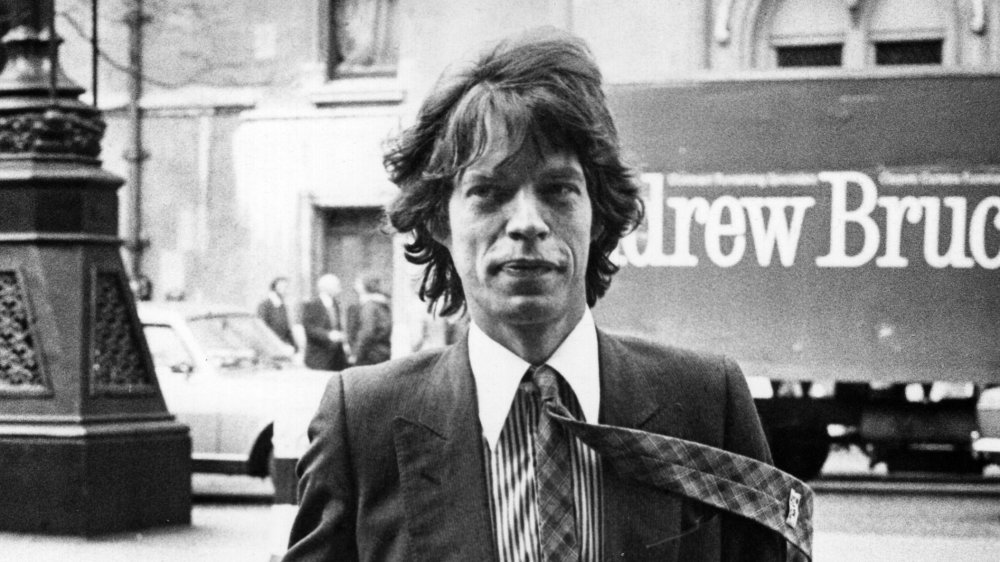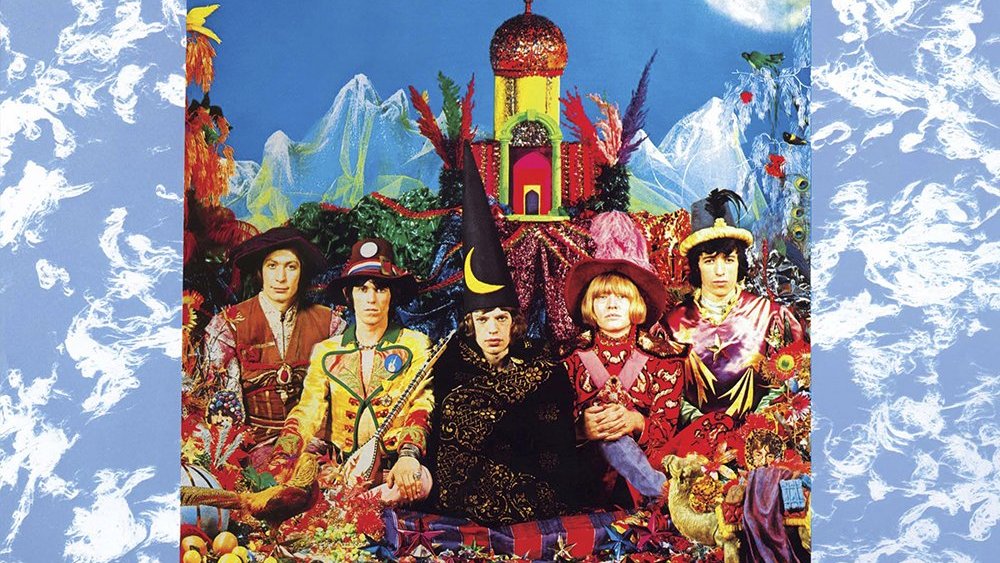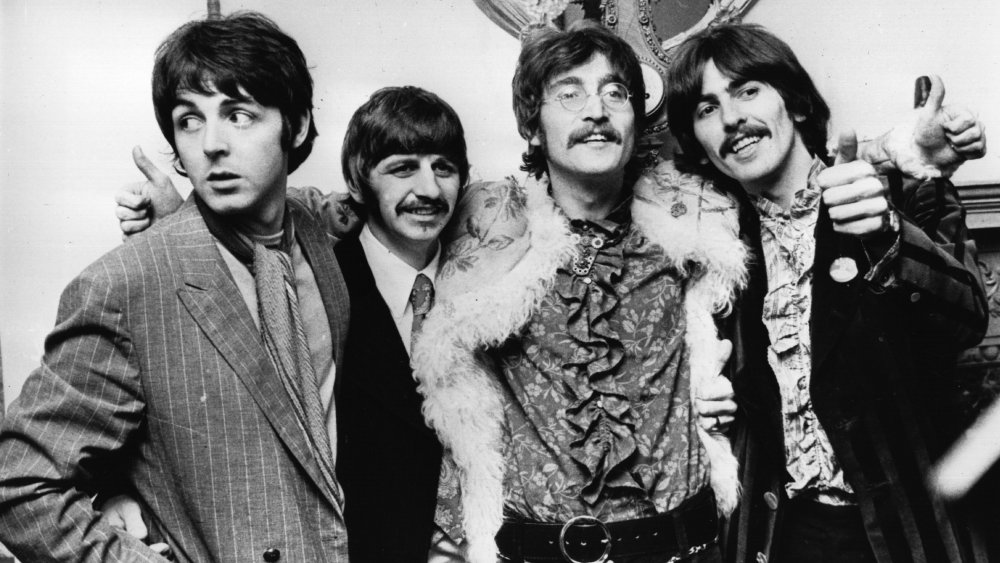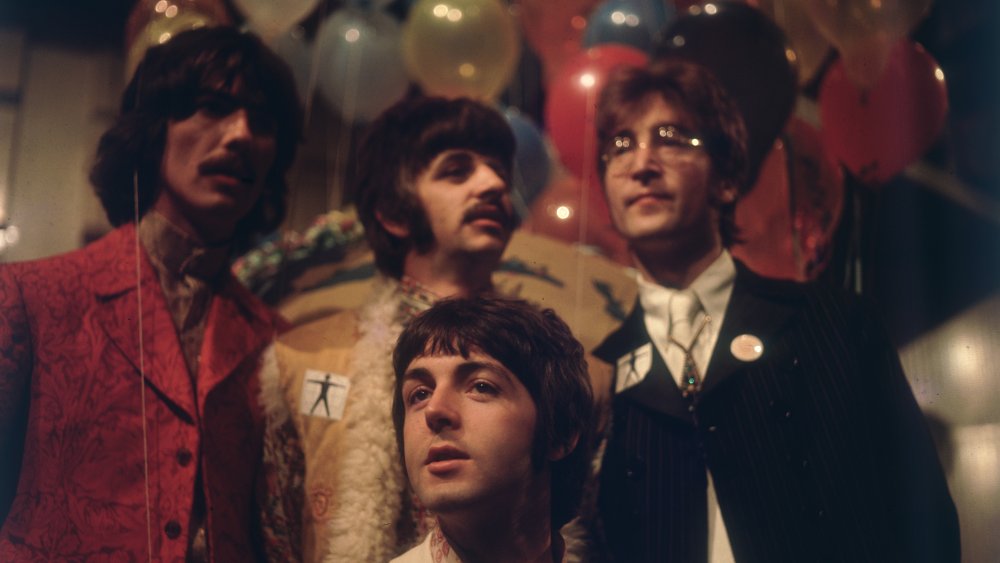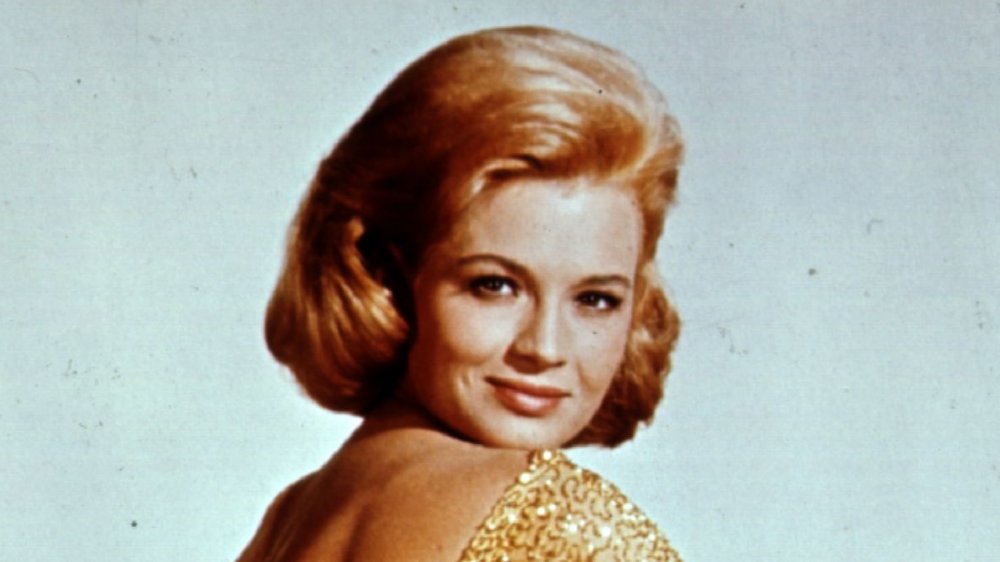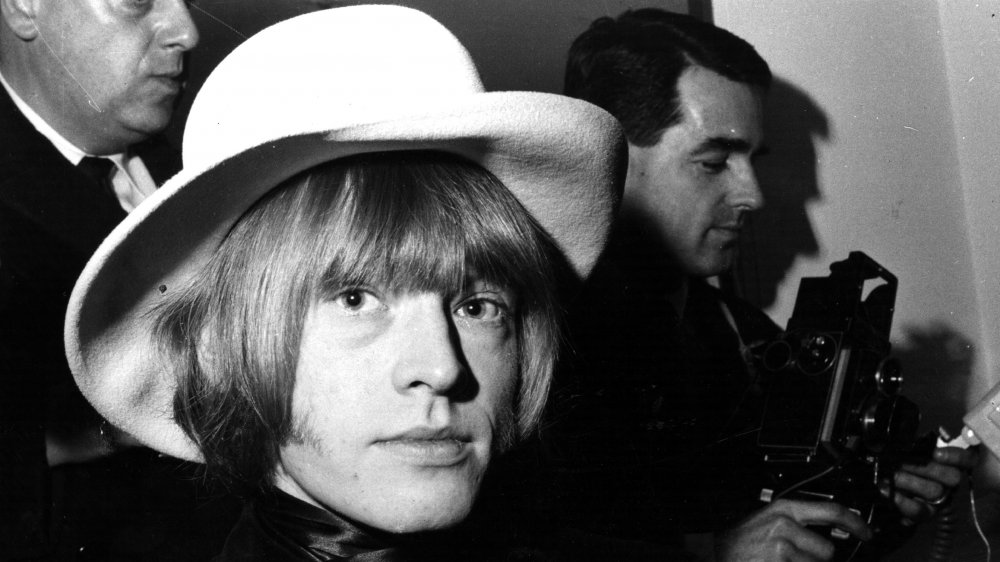False Things You Believe About The Rolling Stones
The Rolling Stones are practically synonymous with rock 'n' roll. After six decades, the Stones are all in their seventies (or passed on), so it's easy to be unaware of their impact when they first hit the scene with their debut album The Rolling Stones in 1964. Unlike the Beatles and other "British Invasion" bands, they took their musical cues from down-and-dirty blues music, eschewing the bright melodies and complex arrangements other bands were experimenting with in favor of driving beats and powerful guitar riffs. Their songs' surface roughness hid a beautiful professionalism: The rhythm section of drummer Charlie Watts and bassist Bill Wyman were tight and musically complex, while Keith Richards' guitar-playing was organic and loose, and Mick Jagger's vocals were snarling and almost aggressively nasal.
They were unlike anything else that had ever happened in pop music, and for a long time, they were the biggest rock band in the world, bar none. That kind of celebrity, coupled with rock 'n' roll's natural myth-making machinery, means that plenty of crazy rumors have grown up around the band over the years — here are some of the false things you believe about the Rolling Stones, and the truth behind the myths.
Myth: the Rolling Stones ignored Meredith Hunter's death at Altamont
The Altamont Free Concert is considered to be the final chapter of the romantic view of 1960s America, the day that the Summer of Love ended in death and chaos. It's also the source of one of the darker rumors about the Rolling Stones: that they kept playing after a fan named Meredith Hunter was stabbed to death by Hells Angels in a chilling display of cold-blooded amorality.
As Forbes reports, the Stones were smarting from missing out on Woodstock and from criticism over high concert ticket prices and thought this "West Coast Woodstock" would firmly embed them in the counterculture pantheon. But according to The Washington Post, the concert was poorly planned and was already spinning into chaos by the time the Stones arrived. The worst decision was hiring the Hells Angels, a criminal biker gang, to act as security for the event, paying them with $500 worth of beer.
Despite the rumors, the Stones weren't unconcerned with what was happening. As the crowd clashed with the Angels, Rolling Stone reports that Jagger and the band stopped several times to plead for calm — and seemed to have achieved it when they resumed playing. While Hunter's death is easy to see on film, the fact is that almost no one in the crowd realized he'd been killed — and the band, far away under the bright lights, had absolutely no idea what had happened until some time later.
Myth: Keith Richards had a full blood transfusion
This is probably one of the most famous rock 'n' roll myths of all time. Keith Richards, the lead guitarist and one of the band's primary creative forces, has led a legendary life of substance abuse excess — in fact, BBC News reported that Richards only stopped using cocaine at the age of 62.
As Richards has aged, his apparent good health and longevity have spawned jokes that have become legends, which is probably why an off-the-cuff joke he made decades ago has grown into one of the most shared myths about the band: that in order to kick his drug habit, Richards had to have a special treatment done where all the blood in his body was pumped out and replaced. There's a reason this myth is so popular: It matches the image of Richards as superhuman — naturally, someone able to consume an epic amount of drugs would need an epic treatment to get off them.
The only problem, as CNET reports, is that it's not even a little true. In an interview with The Scotsman back in 2005, Richards spilled the truth: He made it up as an offhand joke. "It is rubbish,” he said. "Once, I was at Heathrow Airport on my way to Switzerland for treatment for heroin addiction. I met some youngsters who asked me where I was going. I said to Switzerland to exchange my blood. They didn't understand me, obviously."
Myth: the Rolling Stones never sold out
The Rolling Stones have a carefully cultivated reputation as rock rebels, true believers in the power and purity of music. Despite the aggressive branding the band has always engaged in, not to mention Mick Jagger's legendary business acumen, many still buy into the idea that the Stones are rockers who'd never stoop to selling out.
Yet, as Esquire reports, the band was perfectly happy to take a check to write nothing less than a commercial jingle for Rice Krispies in 1964 — a song that was written by the band's original guitarist Brian Jones and sung by Mick Jagger himself. This was before the Stones had their true breakout smash hit with "Satisfaction" a year later, so the money was probably very welcome.
People found the idea that the Rolling Stones, often referred to as the World's Greatest Rock Band, would record a commercial jingle to be so disturbingly preposterous that the mythbusters at Snopes had to get involved, and they even got a confirmation from Kellogg's that the video floating around the Internet is a legitimate commercial that aired in the US in 1964. The most interesting part of this story is that the jingle is actually a pretty great piece of 1960s rock music.
Myth: the Rolling Stones always had five members
Most people can name at least two members of the Rolling Stones: Mick Jagger and Keith Richards (sometimes referred to collectively as the Glimmer Twins). Many can also name drummer Charlie Watts and longtime guitarist Ronnie Wood and founding member Bill Wyman, or the tragic figure of original guitarist Brian Jones. Whatever the configuration, it's pretty much a given that the Stones have always been a five-piece band: Two guitarists, a singer, a bass player, and a drummer. They might hire other musicians for recording or touring, but there were always five actual bandmates. Except, this isn't true. There was, for a long time, a sixth member.
According to Rolling Stone, keyboardist Ian Stewart was the first musician to answer an advertisement placed by Brian Jones in 1962. Jones and Stewart were the original members of what would become the Rolling Stones, but in 1963, the band's manager Andrew Loog Oldham decided that Stewart didn't have the right look for the band. But instead of being fired, Stewart was made road manager and continued to play keyboards and other instruments for the band — essentially as an employee — until his untimely death at age 47 in 1985.
If you have any doubts about Stewart's status as the hidden sixth member of the band, consider the fact that when the Rolling Stones were inducted into the Rock and Roll Hall of Fame in 1989, Stewart was included with all the others.
Myth: the Rolling Stones are proud of all their songs
The Rolling Stones have written some of the all-time classics of rock music. "Satisfaction," "Start Me Up," "Street Fighting Man" — even the songs that are considered to be their B material would probably be other bands' best stuff. And many of these songs aren't just good for their time period, they're timeless — well-composed tunes with clever lyrics and iconic performances. So, you'd be forgiven for thinking that the Stones are proud of all their songs — or at the very least proud of the big hits, the songs that everyone wants to hear. But you'd be wrong.
In an article focused on the song "Brown Sugar" (off the 1971 Stones album Sticky Fingers), however, Vulture puts that lie to the test. As Jagger himself told Rolling Stone in a 1995 interview, "God knows what I'm on about in that song. It's such a mishmash. All the nasty subjects in one go ... I never would write that song now."
In fact, Jagger is so embarrassed by "Brown Sugar" (which is about slave owners forcing themselves on their female slaves) that he routinely changes the lyrics when he sings the song in concert. Considering how big a hit it is, that says everything you need to know about their attitude toward the song.
Myth: the Rolling Stones are rough rebels
From the very beginning, the Rolling Stones were marketed as the rough, snarling alternative to the cute, handsome Beatles. They emphasized working-class roots and bad-boy shenanigans, and as they aged and grew more famous, they embraced the decadent "elegantly wasted" image at the core of rock stardom.
The fact is, the band members were never as rebellious as they might have appeared. As Freakonomics notes, Mick Jagger was actually a student at the prestigious London School of Economics when he joined the band — and as author Christopher Andersen writes, he got a scholarship because of his good grades. Writer Victor Bockris reveals that Keith Richards was once a choirboy and a member of the Beaver Patrol, which Richards describes as essentially the English Boy Scouts. And according to Design Week, drummer Charlie Watts had a pretty solid career going as a graphic designer before joining the band — not exactly a rough-and-tumble background fueling a rock 'n' roll lifestyle.
In fact, as The Guardian reports, when he was still in his mid-twenties, Mick Jagger sat down with his accountant to discuss setting up a pension for his old age, on the assumption that it was ridiculous to think he'd still be playing rock music past 60. Whatever their image, the Stones aren't really rebels.
Myth: the Rolling Stones are Satanists
On the one hand, when you put out an album titled Their Satanic Majesties Request and follow it up with a hit song called "Sympathy for the Devil," you're kind of asking to be labeled a Satanist. On the other hand, both album and song are pretty obviously theatrical and impossible to take seriously as declarations of loyalty to the Dark Lord.
As The Independent reports, Jagger, who wrote "Sympathy for the Devil," had no idea how the song would be interpreted. He was largely inspired by the classic novel The Master and Margarita by Mikhail Bulgakov, which features an urbane, witty devil as a main character. But people began to characterize the Stones as Satanists, or at least as practitioners of the occult because of the first-person nature of the lyrics, with Jagger role-playing as Satan.
A year later, the Stones were onstage at Altamont when Meredith Hunter was killed by a Hells Angel working as security for the concert — and a rumor started immediately that the killing occurred while the band played "Sympathy for the Devil." This wasn't true, but it was disturbing enough that the band didn't play the song live for a few years. The myth of the Stones' interest in Satanism and the occult was impossible to shake afterward.
Myth: Mick Jagger slept with David Bowie
Rock 'n' roll has always been marketed as much as a lifestyle as a form of music, and that lifestyle is usually marked by excess and licentiousness. It's almost a given that rockers, especially during certain periods of history when things seemed crazier than usual (you know, the 1970s), would engage in some pretty far-out behavior. So when Angela Bowie, finally freed from a ten-year gag order after her 1980 divorce from rock star husband David Bowie, announced on The Joan Rivers Show that she's once walked in on Bowie and Mick Jagger in bed together, it was sensational — but just about everyone believed it.
After all, Bowie and Jagger were longtime close friends and spent a lot of time together. And Bowie, especially, had cultivated an androgynous image that made it easy to imagine his sexuality was fluid.
One problem: There's never been any evidence that it's true, apart from Angela Bowie's statement. According to Snopes, Angela was pressured into saying something sensational by Rivers and fellow guest Howard Stern, and she walked back the story almost immediately, admitting that she didn't actually see anything happening. When Bebe Buell, who dated both men, was dragged into it by author Christopher Andersen, Rolling Stone reported that she exclaimed, "This entire Bowie/Jagger thing is completely stupid and false!"
Myth: the Rolling Stones' rivalry with the Beatles was real
In the early 1960s, the Beatles and the Rolling Stones seemed like polar opposites. On the one hand, you had the clean-cut, cutely hilarious Fab Four with their neat suits and haircuts. On the other, you had the surly, rough-looking Stones and their more aggressive, bluesy rock music. They were often portrayed as rivals, with the Beatles mocking them for copying their genius and the Stones regarding the Beatles' artistic affectations as silly.
But as Salon notes, author John McMillian makes it clear in his book Beatles Vs. Stones that this was all just marketing, the desire of the music press to have a story, and the aggressive competitiveness of the bands' managers. The fact is, the Rolling Stones considered their style of music distinct from the Beatles — they were a blues band, the Beatles a pop band. The two groups were generally friendly, and the Stones even recorded a song written by John Lennon and Paul McCartney: 1963's "I Wanna be Your Man." Not exactly the move of bitter rivals.
Of course, time moves on, and in recent years, an animosity has definitely bloomed between the bands. As Esquire reports, Paul McCartney told Howard Stern in 2020, "The Beatles were better. [...] We started to notice that whatever we did, the Stones sort of did it shortly thereafter." Jagger won the round, though, with his scathing remark reported by Rolling Stone: "One band is unbelievably luckily still playing in stadiums, and then the other band doesn't exist."
Myth: the Rolling Stones just copied the Beatles
Over the years, one of the most persistent myths offered up about the Rolling Stones is that they simply copied whatever the Beatles did, just with less genius. Examples that supposedly prove this include traveling to America (which was simply the biggest market for rock music at the time) or the release of Their Satanic Majesties Request, which seemed to copy the Beatles' Sgt. Pepper's Lonely Hearts Club Band down to the eye-catching cover art.
One of the main examples cited is usually the Stones song "As Tears Go By," released in December 1965 — a few months after the Beatles released "Yesterday." The latter song was a sensation, a soft, acoustic ballad with a string section. It was such a departure for the band that they weren't sure how to record it, as it didn't have a part for drummer Ringo Starr to play. "As Tears Go By" seems like a ripoff at first: a soft, acoustic song with a string section from a band known for its hard-rocking style.
Except ... as author John McMillan writes, the Stones song was written a year earlier and had actually been recorded and released in 1964 by Marianne Faithful. If anyone was copying anyone, it was the Beatles.
Myth: "Angie" is about a real person
Any time a song has a person's name for a title, it's easy to imagine there had to be a real person in mind when it was written. "Angie" is one of the most famous songs the Rolling Stones ever recorded. Although credited to both Mick Jagger and Keith Richards, the song was almost certainly written entirely by Richards, and when people started to wonder who Richards might have written this plaintive love song about, they didn't have any shortage of suspects.
First, there's Angela Bowie, wife of David Bowie — according to Stereogum, one rumor has it that the song was written to appease her after she caught her husband in bed with Mick Jagger. But that's almost certainly not true, and even if it was, having a sad ballad with your name seems like pretty weak tea when it comes to appeasing a betrayed wife. Then there's the idea that the song is a tribute to Richards' newborn daughter Dandelion Angela, which is certainly plausible. Another popular theory is that it's about actress Angie Dickinson, which, well, sure, although Dickinson was married to composer Burt Bacharach at the time, and there's no evidence she ever had a relationship with any of the Stones.
While all these rumors are fun, Richards debunks them pretty dismissively, explaining that he just needed a name that fit the meter and rhyme scheme, a "generic" girl's name.
Was Brian Jones Murdered?
One of the most persistent rumors surrounding the Rolling Stones involves the man who founded the band, Brian Jones.
Jones, volatile and vain, was a tremendous musician and songwriter but became increasingly disinterested in playing music with the Stones as they became increasingly successful (and decreasingly reliant on his contributions). His drug use and alcoholism didn't help matters, and in 1969, he was officially fired from the band after several years of declining contributions. (He only played on two songs on the band's 1969 album Let it Bleed). A few months later, Jones was dead, found at the bottom of his swimming pool. The cause of death was officially listed as "misadventure," but rumors that he was murdered have persisted ever since, with the main theories focused on a contractor Jones had hired to renovate his house and, as LA Weekly reports, fired on the day of his death after weeks of disputes.
As NME reports, Jones' daughter Barbara has long maintained that her father was murdered, and Tom Keylock, who was present the night of Jones' death, claims that the police covered up an incompetent investigation. On the other hand, the investigation into Jones' death was actually officially reopened in 2009 — and the investigators ultimately concluded there was no reason to doubt the original cause of death. At this point, we may never know.



